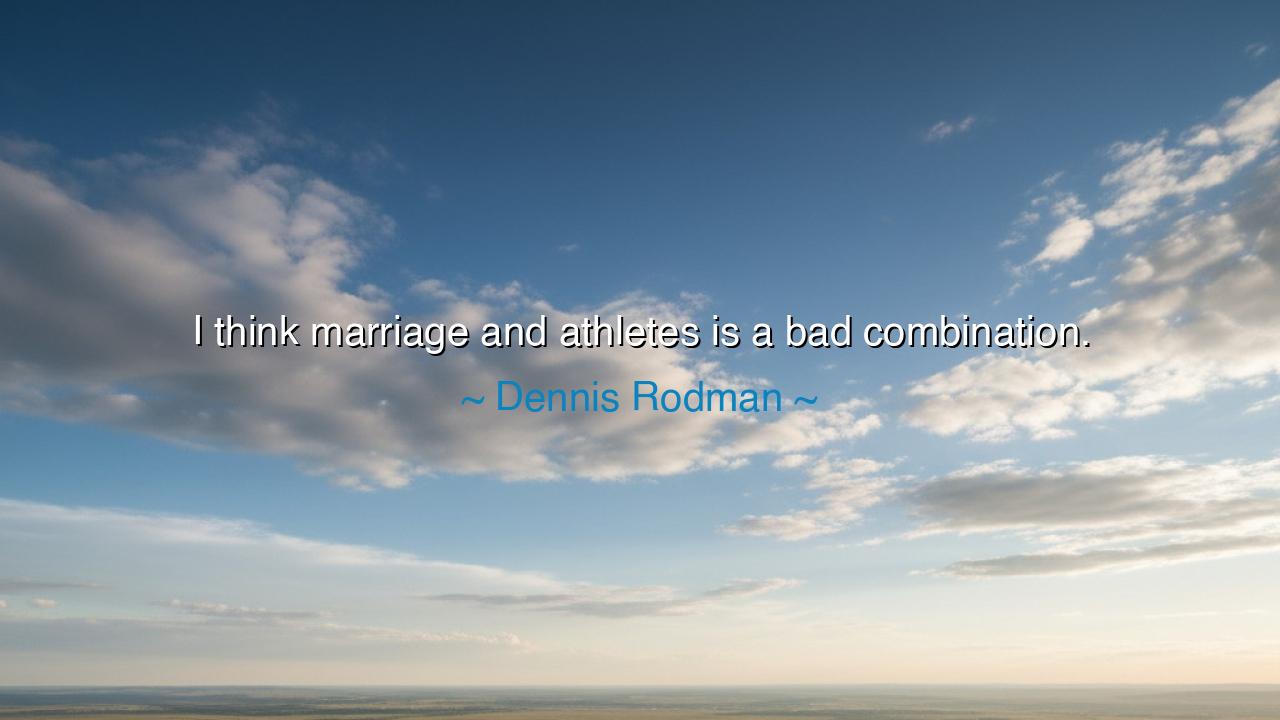
I think marriage and athletes is a bad combination.






In the arena of life, where the heart battles between personal ambition and relationships, the words of Dennis Rodman—“I think marriage and athletes is a bad combination”—reveal a profound reflection on the sacrifices required by both. As Rodman points out, the intense commitment and focus that an athlete must pour into their craft often leave little room for the nurturing of a relationship as intimate and demanding as marriage. His words, though controversial, speak to a timeless truth about the tension between career and personal life, one that the ancients understood deeply. Just as Hercules faced trials that tested both his strength and his ability to live a balanced life, Rodman’s assertion invites us to ponder the sacrifices required by those who walk the path of both love and glory.
The ancients recognized that every pursuit, whether in the art of war or the art of peace, required a balance of self and other. The Roman general Scipio Africanus, for instance, was a master of the battlefield, yet his personal life was marked by loneliness and a lack of deep connection. While his victories on the field brought him fame, the demands of leadership and military service kept him from nurturing lasting personal relationships. His life was a testament to the toll that ambition and commitment to one's craft can have on one's personal life, particularly marriage. In much the same way, Rodman's quote highlights how the intense focus demanded by an athlete’s career can conflict with the mutual commitment required by a marriage, leaving little space for personal intimacy.
Consider the life of Achilles, the great warrior in Homer’s Iliad, whose glory on the battlefield was achieved at the expense of his personal happiness. His relationship with Patroclus was one of deep emotional bond, but it was overshadowed by his commitment to the war effort. Achilles’ tragic flaw was his inability to reconcile the sacrifice required by his pursuit of glory with the emotional needs of his companions. His relationship with Patroclus could not thrive amidst the chaos of war, and his sorrow after Patroclus’ death is a reflection of the cost of focusing too intensely on external goals at the expense of the heart. In this ancient story, we see a timeless lesson: the pursuit of greatness in one field can exact a toll on the sacred bonds we form with others.
This same dynamic plays out in Rodman’s statement, where the athlete’s pursuit of excellence often requires the sacrifice of a personal life. Rodman, a man known for his fierce drive on the court, found his relationships strained by his need to devote himself to his craft. Marriage, with its intricate interdependence, demands a level of attention and dedication that often conflicts with the single-minded focus required to excel in the highly demanding world of professional sports. Rodman's remark is not a condemnation of marriage or of athletes as a group, but a reflection on the reality that in the life of an athlete, the sacrifices can sometimes outweigh the rewards, particularly when it comes to sustaining a personal, intimate relationship.
Take, for instance, the life of Michael Jordan, the legendary basketball player, who became synonymous with winning and greatness. His commitment to his sport was unquestionable, and while his marriage endured for many years, the pressure and demands of his career weighed heavily on his personal life. Jordan’s marriage went through challenges, and while he maintained a certain public image of the ideal athlete, there were moments when his dedication to basketball overshadowed his commitment to his family. The balance between personal and professional life remains a difficult one for many athletes, and Jordan’s story echoes the sacrifices that Rodman highlights in his quote. The reality is that pursuing the height of achievement in one area often requires giving up a certain amount of emotional connection in others.
The lesson from Rodman's words is a powerful one: the quest for excellence in any field, be it athletics, art, or politics, can place tremendous strain on relationships. Marriage, as one of the most profound unions between two people, demands mutual nurturing and growth. Yet, as history shows, the demands of public life—whether as a warrior, a philosopher, or an athlete—can often leave little room for these quiet, sacred acts of personal connection. The tension between glory and love is a universal one, calling on each of us to navigate the sacrifice required by our chosen pursuits.
In our own lives, let us understand the balance between commitment and self. While we may not all be athletes or warriors, we too face the challenge of balancing the ambitions that drive us with the relationships that sustain us. The wisdom of Rodman, filtered through the lens of ancient experience, calls us to reflect on how we can pursue our highest goals without forsaking the personal bonds that bring us true happiness. Let us strive to honor both our work and our relationships, finding ways to give each the attention it deserves, without allowing one to overshadow the other. Just as the ancients sought balance, so too must we in our own lives, learning from those who have walked the path before us.






AAdministratorAdministrator
Welcome, honored guests. Please leave a comment, we will respond soon